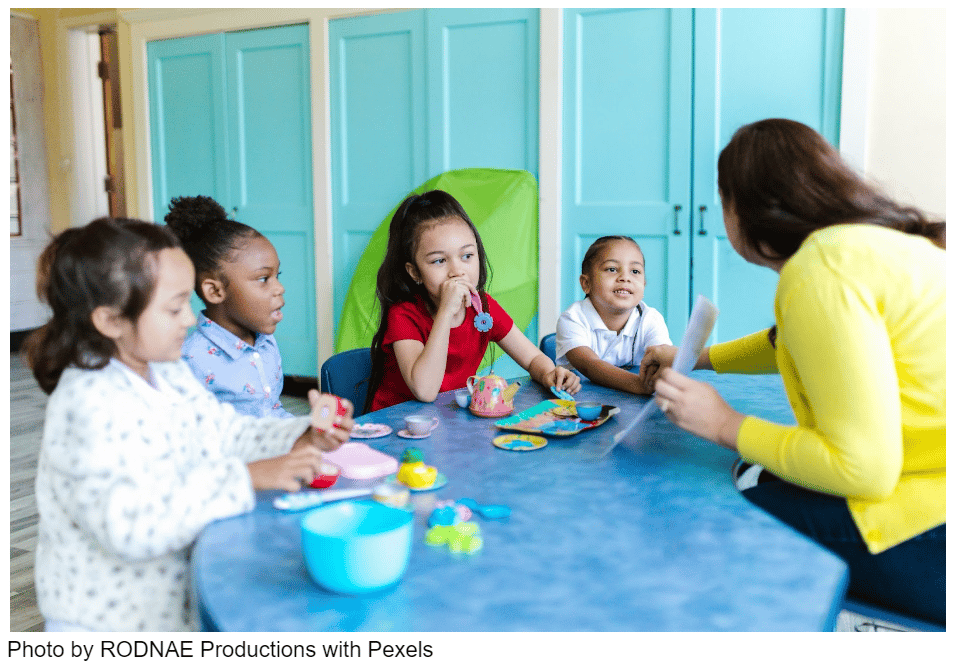
Written By: Christy S. Renjilian
Do you know the average cost of care for children enrolled in an early childhood education center?
- For infant care, the average annual rate is $14,000.
- For toddlers, it’s $13,500.
- And for preschoolers, the number is $11,700.
And these costs vary widely from state to state.
In Mississippi, it costs $5,400 per year for a four-year-old. . . and almost $17,000 in Massachusetts. [Source: US News]
According to the Child Care Aware of America report, “Demanding Change: Repairing our Child Care System,” in every part of the country families are paying a higher percentage of their household income for child care than for housing, transportation, food, health care, or college tuition.
However, in the childcare sector, price does not equal cost. If providers charged families the true cost of care, what their actual expenses are, particularly if they factor in paying their teachers a living wage comparable to those of Kindergarten teachers, most families would not be able to afford it.
The true cost of offering high-quality child care would be even more out of reach for families. The difference between the true cost and the fees actually charged was seen in every state.
The US Department of Health and Human Services recommends the price of child care be no more than 7% of household income.
Most families currently pay significantly more than that.
And if providers charged the true cost, it would be even higher.
However, the US government only spends about 0.2% of its GDP on child care, roughly $200 per year for most families, while other countries spend on average, 0.7% of their GDP. [Source: The New York Times]
The lack of assistance in the US makes childcare incredibly difficult to afford.
In some countries care is free beginning at birth, while many have free preschool or tax credits to assist families in paying for care.
Childcare prices typically rise with inflation. However, while programs need to raise fees to keep up, they’re reluctant to do so because they know families can’t afford to pay more.
Let’s take a closer look at early childhood education.
Why is Quality Early Childhood Education So Expensive?
Quality child care is expensive because of the low teacher-to-child ratios.
For infant care, one teacher can care for up to four children. And with no other (or limited) sources of revenue helping to cover the costs, the entire cost is supported by the family.
Birth through Kindergarten is the most expensive education cost, because of these low teacher-to-child ratios, and it’s the ONLY time when there are no public funding options for families at all economic levels.
The exception is low-income families who receive support and public funds through Child Care Works, Head Start, or Pre-K Counts,
People often compare the cost of infant care to college tuition — the average annual cost of tuition at a Pennsylvania public college is $13,416 [Source: College Tuition Compare].
While the cost of infant care is high, four infant shoulder the burden of the entire cost for the staff salaries, benefits, and all operating costs. In comparison, no college professor only teaches four students per year.
And colleges have additional sources of revenue from things like alumni giving, endowments, athletics, research grants, and public dollars.
Could you imagine if your child care had the revenue from selling branded items in the same way Penn State does?
It’s absurd that we expect families to shoulder the full true cost of care—particularly when we know they struggle to pay the charged price.
And even more so when you factor in that the return on investment for high-quality early childhood education is far greater than the return on investment from K-12 and higher education.
Why Is Early Childhood Education Worth It?
When we invest in our children from the youngest ages, prenatally, we can have a significant impact on their future.
Research proves, over and over again, high-quality early childhood education has the following effects:
- A child’s future educational attainment
- Improves their physical health and well-being
- A reduction in incidences of chronic disease
- Increased resilience and protective factors that lessen the impacts of toxic stress
- And it promotes healthy, solid relationships between caring adults and children
Quality early childhood education also saves taxpayer dollars in the traditional Kindergarten-to- Grade 12 systems, juvenile delinquency, special education, truancy, and incarceration.
It’s always better to invest in a young child now rather than spend money trying to remediate problems later.
It’s also worth it because according to the Ready Nation report, the economic impacts of insufficient child care on working families cost Pennsylvania $2.5 Billion annually. Productivity problems related to childcare struggles (missing work, being distracted while at work) cost employers $600 million annually.
If we asked Pennsylvania employers to invest $600 million in high-quality early childhood education–it would be a “net zero break-even proposition” that would result in improved performance in their current workforce and improved outcomes for their future workforce.
How CCC Impacts Early Childhood Education in Central Pennsylvania
CCC is responsible for the programs that help low-income working families pay for child care. More specifically, the Child Care Works (CCW) and Keystone STARS programs.
CCC also administers both the Resource & Referral program to help families in our region find child care and the Statewide HelpLine.
In this capacity, we determine eligibility for CCW, help families determine their personal needs for child care, and provide lists of programs that meet their specific criteria.
We also work with area businesses to provide resource and referral services for their employees, lunch & learn sessions on child development, Kindergarten transition and readiness, and summer programs—to name just a few topics.
The Keystone STARS team provides one on one support for providers as well as assessing their program against the state standards to determine their STAR level. It includes coaching, mentoring, training, and support to help providers improve their quality.
A STAR 1, is the entry point—for all Department of Human Services Certified programs. STAR 4 is the highest level of quality.
CCC also administers grants and engages with business and community leaders to provide funds for early childhood education programs. In the past year, CCC’s efforts resulted in over $1 million in additional funds.
And how does that funding cycle work?
CCC received a five-year grant from the Pennsylvania Office of Child Development and Early Learning (OCDEL) to oversee the CCW and Keystone STARS program.
For funds that support CCW and assist working families in paying for child care, it’s a multi-step process. Each step has its own federal and state regulation and policies.
First, a family submits an application that includes verification of their family size, employment by their employer, and pay stubs. Once determined to be eligible by our staff, then they select a childcare program (if they don’t already have one). The schedule that their child can attend is based upon the parent’s work schedule.
The childcare program takes attendance daily and parents are required to sign their child in and out each day. The program submits their attendance records, used as the basis for the invoice, to CCC no later than the fifth of the month after the month they attend. So, on December 5, 2022, they will submit the attendance records for November 2022. CCC staff reviews the invoice, checking the days attended against their approved schedule. Payments are made directly to the child care provider.
Families are also assessed a copay, based on their income, which they pay directly to their childcare provider.
Families’ eligibility is redetermined every year, and they must submit current documentation of their income and any changes to their family size.
The funds come from both the federal and state budgets.
What Do Parents Need to Know About Early Childhood Education?
Parents want the best for their children. And they know first-hand that quality early childhood care is essential.
A child’s brain and socio-emotional skills are rapidly developing in the first five years. There is no other stage of life when their brain will be developing so quickly. And research proves that what happens in the first five years matters—it greatly impacts the rest of a person’s life.
By enrolling your child in a high-quality program, you are helping to ensure that your child will be successful in K-12 and life. So ask your child’s provider if they participate with Keystone STARS or have plans to explore the program.
We encourage parents to base their child care decisions not just on the cost of care, or the location of the care, but on the quality of the care.
Just like many adults make housing decisions based upon which school district their child would attend, it’s important that parents and guardians pay attention to the quality of the childcare programs in the area.
If you are struggling or would like more information, please reach out or visit our website.
About Community Connections for Children, Inc.
Community Connections for Children, Inc. (CCC) is a nonprofit centered in the heart of Pennsylvania. They serve childcare providers and low-income families ‒ the ones that have been impacted the most by the pandemic.
For you and your business, CCC helps keep childcare options open for your employees ‒ saving missed work hours and lowering on-the-job stress levels. They work with early childhood education programs and home-based providers to improve the quality of care, ensuring that all children enter school ready to be successful.
Christy Renjilian serves as its Executive Director.
To learn more, visit childcareconsultants.org.
Additional Reading
The Uncertain Future of Early Childhood Education
Bankrate: Average Cost of Childcare
American Progress: True Cost High-Quality Childcare Across US
World Population Review: Child Care Costs By State
US News: States with Highest and Lowest Cost of Daycare
Childcare Aware: Demanding Change Repairing Our Child Care System
New York Times: How Other Nations Pay for Child Care. The U.S. Is an Outlier
College Tuition Compare: 2022 Tuition Comparison Between Pennsylvania Colleges

